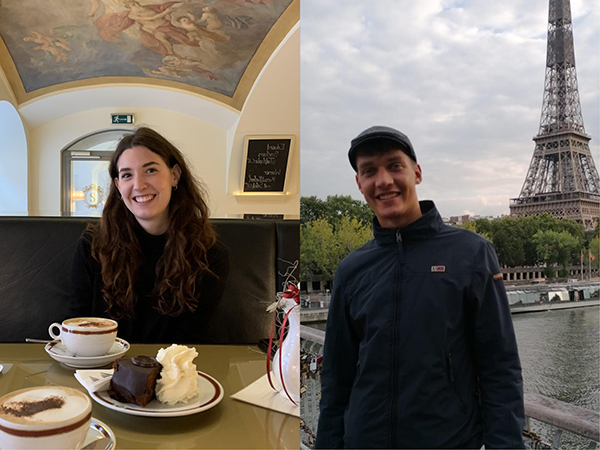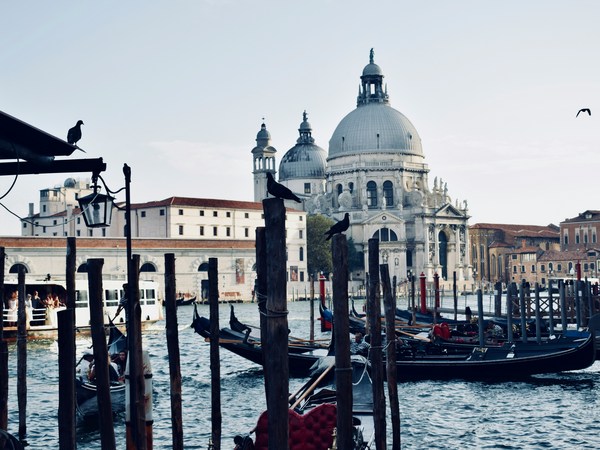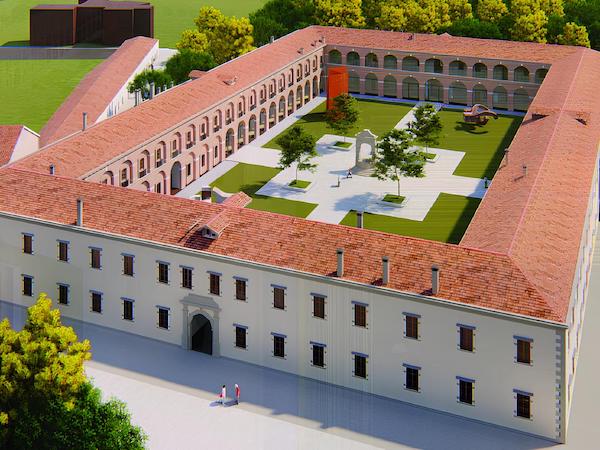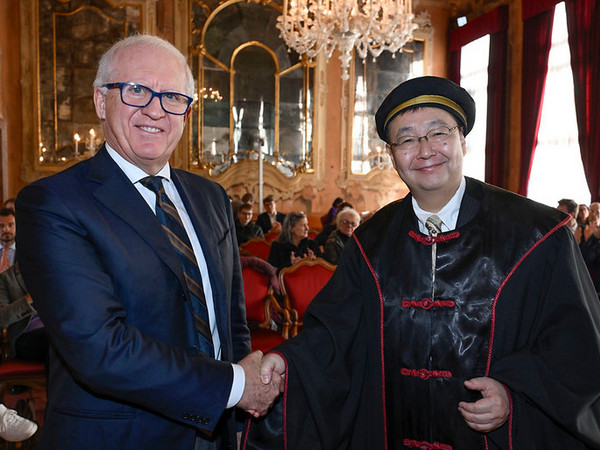A truly international university experience is guaranteed when you choose a double or joint degree (DJD). These degrees provide an integrated study curriculum with international universities and mobility periods abroad. After the final examination, students achieve a double or joint degree issued by the partner universities.
Ca’ Foscari offers a variety of DJDs, both at a Bachelor’s and Master’s level. We interviewed Marta Ongaro, who is studying for the Double Degree in English and American Studies at the University of Graz (Austria), and Luca Doretto, who is studying for the Double Degree in Economics and Finance (MEF) at Université Paris Dauphine (Paris).
Marta, Double Diploma in English and American Studies: “I’ve studied abroad to invest in Venice”
What are you studying and why did you choose a DJD?
After graduating in English and Spanish at Ca’ Foscari, I was looking for a Master’s Degree in English language and literature. As I was browsing through Ca’ Foscari’s website, I happened to find the Double Degree in English and American Studies, and I was drawn to the Literary Studies curriculum.
The DJD enabled me to move to Austria despite the Covid-19 pandemic. I studied at the University of Graz from September 2020 to January 2021. During the first month, classes were in person, while during the following months they were online. I think I was really lucky since other international exchange programmes, such as the Erasmus programme, were cancelled because of the pandemic. Instead, the DJD made it possible for me to go abroad.
What makes a DJD special? Tell us about your international university experience.
A DJD is an extra opportunity. In the world of work, a DJD can give you an advantage, in Italy and abroad. From a personal point of view, it enables you to get to know places, people and cultures that you otherwise wouldn’t have experienced.
In my case, for example, I chose Graz, a small university city in Austria, precisely because it wasn’t connected with my previous experience as a student – I didn’t even speak German! Luckily the University of Graz offers intensive language courses, so I studied German five hours a day for three weeks. This was definitely an added bonus.
Another important benefit is that studying abroad allows you to experience a different university setting and different teaching methods. In Graz, lessons are more like workshops in which you have to interact with your fellow coursemates, and then you have to write papers. This method is not only engaging: it also helped me perfect my writing skills, which will certainly be useful when I write my dissertation.
Tell us five things you should “take” with you when you prepare for this experience.
- The first one is courage: don’t be afraid to go for it!
- The second thing is a good language course
- The third thing is the ability to adapt. When I arrived in Graz I went into quarantine with two Austrian people I didn’t know, which is something that hadn’t happened to me before
- The fourth thing is the ability to face challenges: in fact, even though the University of Graz was international and academic, the country was still foreign to me, with a foreign language and culture
- The fifth thing is clothes that are suitable for the place and season! In my case, I needed heavy clothing, since winter in Austria can be very snowy
Let’s talk about universities: what are your favourite places in Venice and abroad?
I would say libraries, both in Graz and in Venice.
In Graz there is a popular library which is architecturally unusual; it is composed of an older section, with nice wooden tables, and above this section there is a modern structure. In Venice, I study in Zattere.
Libraries are really, really important, especially now: they give you a reason to get out of the house, and in my case they help me focus on my studies.
Imagine your future: where do you see yourself in 5 years?
By studying abroad, I was able to experience living in places that are quite different from home. However, I’ve decided to invest in my city, Venice. When I graduate, I’m going to look for a job that matches my studies – something in the field of tourism, languages, or language teaching – so that I can do what I love, in the city I love.
Luca, Double Degree in Economics and Finance: “The first thing your should take with you when you embark on this journey is curiosity”
What are you studying and why did you choose a DJD?
I chose this DJD because after graduating in economics in Trieste, I wanted to study in Italy and abroad. My course, MEF, offers students the opportunity to study in France (in Paris or Marseilles), and given that I speak French for family reasons, I thought it would be the perfect choice for me.
I was selected with another 5 Ca’ Foscari students, and we lived in Paris from August to December 2020. We studied at Université Paris Dauphine, not far from the Arc de Triomphe. We lived in the student dorm, which made everything easier – even meeting other students. Despite the pandemic, we were able to study in person until November. We met a lot of French students and German students from Goethe University. We got along really well and we became a team, especially with the students who, like us, were interested in environmental issues.
Dauphine also offered a French language course on Saturday mornings, and when all the other courses went online, the language course continued online as well. Even beginner students enjoyed the course and after a month they were able to get around the city on their own.
What makes a DJD special? Tell us about your international university experience.
Having a DJD gives you an extra boost, both on a personal and on a professional level. International experiences are enriching – they help you develop the skills you need to adapt to new situations. When you live in a different country, you learn so many new things, and this allows you to grow as a person, as you meet and get to know people whose background is very different from your own.
An interesting thing about Dauphine is that when it comes to your final exam or dissertation, you can choose between a theoretical option and a more practical one, which involves doing an internship and writing a final report. The theoretical option is suited to people who would like to continue their studies as researchers, while the practical option is perfect for people who want to enter the world of work. I’ve chosen the practical option, so I’ve been working in Berlin since March 2021.
Tell us five things you should “take” with you when you prepare for this experience.
- The first is curiosity: you need to want to learn about different places and cultures and how they differ from Italy
- The second is the ability to adapt – to different study methods, to a completely different university, to different exams
- The third is the ability to work in a team: there were five of us in Paris and while we had to support each other, we also had to work with our French colleagues
- The fourth is initiative: you need to find the courage to set off on this adventure!
- The fifth is the willingness to socialise and make new friends
Let’s talk about universities: what are your favourite places in Venice and abroad?
In Venice I lived in the Santa Marta student residence and it was a wonderful experience. When I arrived from Trieste I didn’t know anyone, but just a week later I had some friends, people to spend time with and share experiences with. In Paris, too, I really enjoyed living in the university residence. Libraries were closed, so it was really important for us to have a place where we could socialise.
Imagine your future: where do you see yourself in 5 years?
I’m currently working in Berlin for a start-up that deals with PSP (Payment Service Provider) services. When I finish this internship and graduate, I would like to work as a Financial Analyst in a European country, preferably somewhere South (like Spain or Portugal), where the weather is warmer than here in Germany!











